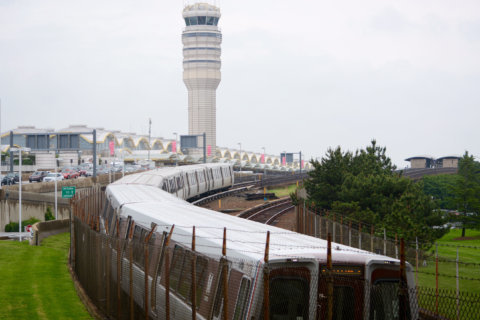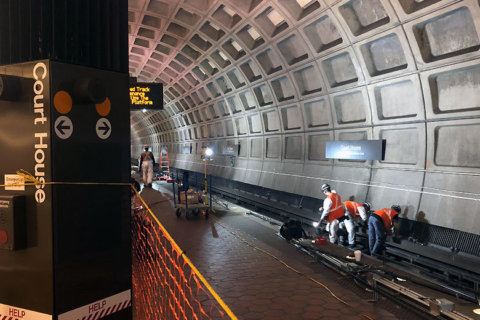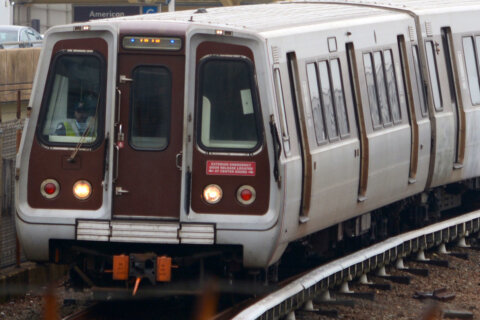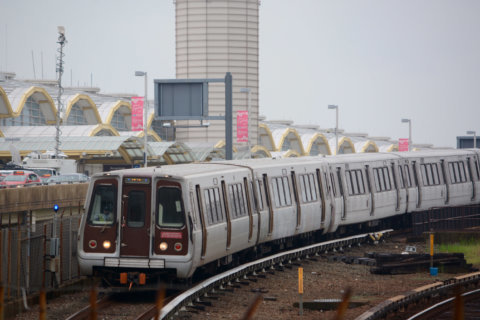The new president of Metro’s largest union opposes lengthy 24/7 shutdowns of the rail system and hopes for more collaboration with riders.
Raymond Jackson spoke with WTOP last week in his first sit-down interview since taking over as president of Amalgamated Transit Union Local 689, which represents about 9,000 frontline workers.
“The first two months of my administration we have really been pounding the pavement trying to let everyone know that we’re out here, we’re here for the safety of the public and we’re also looking for different ways to help the authority improve their service,” Jackson said.
The union has been meeting with politicians across the region and Metro management as part of a busy transition and legislative schedule. Jackson and Metro General Manager Paul Wiedefeld had lunch in January, and plan similar meetings regularly moving forward.
“I hope to have a great working relationship with Paul Wiedefeld,” Jackson said.
Success for him, Jackson said, would be getting the workers, Metro and riders consistently at the table together.
“You’ve got to get out there, engage with your workers and engage with your riders. You have people making decisions on how this system should run from downtown,” Jackson said.
Bus route overhauls — or even minor changes — for example, need a more personal touch, he said, which becomes more important with Metro planning major bus route changes in coming years.
Concern about rail shutdowns
Metro plans a series of 24/7 shutdowns for years to come, including the months-long closure this summer of all Blue and Yellow Line stations south of Reagan National Airport in Virginia, but Jackson said track workers do not believe that is the best route.
“I think that those are the people you need to be talking to. The people who do the work,” Jackson said.
“It’s a very aggressive maintenance schedule. You’re trying to accomplish maybe five years of work in one year. You can schedule that out,” he said.
When Metro began lengthy round-the-clock work zones in 2016, some were single-tracking zones.
However, as the closures went on, Metro decided that the ripple effects of single-tracking on service across other parts of the system justified using more complete shutdowns and less single-tracking, since no additional trains were added elsewhere and more work could be done during a complete shutdown.
Metro also made the switch in part since it felt shutdowns are simpler for riders to understand.
Jackson believes single-tracking would cause less inconvenience for riders, save money with fewer extra contractors needed, and limit the need to repeat these shutdowns a few years down the line.
“If you replace both of your headlights on your vehicle at the same time, then more than likely both of them will go bad at the same time,” Jackson said. “But you only need to replace one. Allow the other one to get the usage out of it and then replace it … They’re replacing everything at one time, so 10 years from now, you’re going to have to stop, shut it all down and do this again, when you really don’t have to because everything isn’t bad.”
“Been here forever”
Jackson started working at Metro in 1987 as a bus maintenance mechanic, and later transferred to railcar maintenance where he rose through the ranks before being elected to union leadership positions.
“I’ve been here forever,” Jackson smiled in his office where union letters, memorabilia, bumper stickers and an image of former president Barack Obama sit on the walls.
In 2016, he represented the union in testimony on Capitol Hill.
Jackson is the first president of the local who did not work as a bus or train operator, the union said.
In addition to building a more personal relationship with Wiedefeld, which Jackson described as in an “infant stage” right now, he is also overseeing the first ever union negotiations for a contract with Alexandria’s DASH Bus and separate contract negotiations with a private contractor Metro recently hired to run the new Cinder Bed Road bus garage in Lorton.
More negotiating meetings are scheduled in coming weeks.
The union remains staunchly opposed to Metro’s similar efforts to privatize operations on the second phase of the Silver Line due to open in 2020.
“[Local] 689 doesn’t want a fight. We’d like to sit down and work out whatever problems we are having. But if 689 has to fight, we will. We are not running from any fights. We’re not looking for any, but we’re not going to run from any. The day when you can just come in and do what you want to do to our members, those days are far behind us,” Jackson said.
He demurred when asked about Metro’s current safety culture, with Chief Safety Officer Pat Lavin due to leave the agency in May after three years.
“I think Pat’s a good guy, I think Pat had great ideas for this company. To be honest, I hate to see Pat leave,” Jackson said.
He is concerned though about bus operators’ safety, and raised questions about the new D.C. law lowering penalties for fare evasion.
“How could you get on the bus and not pay, and then you want to be disrespectful to our operators? They’re humans too. You know most of our operators come out of these areas, these neighborhoods,” Jackson said.
WTOP’s Max Smith interviewed Jackson in Forestville, Md.











